| Listing 1 - 9 of 9 |
Sort by
|
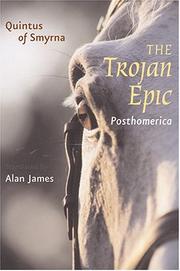
ISBN: 0801892376 1435691989 9780801892370 9781435691988 9780801879654 0801879655 080188635X 9780801886355 9780801886355 080188635X 0801879655 Year: 2007 Publisher: Baltimore, Md. London Johns Hopkins University Press
Abstract | Keywords | Export | Availability | Bookmark
 Loading...
Loading...Choose an application
- Reference Manager
- EndNote
- RefWorks (Direct export to RefWorks)
Book
ISBN: 1316191559 1316189716 1316210057 1316206351 1107423325 1316202712 1139683632 1316208206 1316204553 1107073758 1322521964 Year: 2014 Publisher: Cambridge : Cambridge University Press,
Abstract | Keywords | Export | Availability | Bookmark
 Loading...
Loading...Choose an application
- Reference Manager
- EndNote
- RefWorks (Direct export to RefWorks)
Using Euripides' play Helen as the main point of reference, C. W. Marshall's detailed study expands our understanding of Athenian tragedy and provides new interpretations of how Euripides created meaning in performance. Marshall focuses on dramatic structure to show how assumptions held by the ancient audience shaped meaning in Helen and to demonstrate how Euripides' play draws extensively on the satyr play Proteus, which was part of Aeschylus' Oresteia. Structure is presented not as a theoretical abstraction, but as a crucial component of the experience of performance, working with music, the chorus and the other plays in the tetralogy. Euripides' Andromeda in particular is shown to have resonances with Helen not previously described. Arguing that the role of the director is key, Marshall shows that the choices that a director can make about role doubling, gestures, blocking, humour, and masks play a crucial part in forming the meaning of Helen.
Trojan War --- Women and literature --- Tragedy. --- Drama --- Literature and the war. --- Euripides. --- Helen, --- Elena, --- Helena, --- Helenē, --- Yelena, --- 海伦 , --- ヘレネー, --- הלנה, --- העלענע, --- 헬레네, --- Хелена, --- Єлена, --- Елена , --- هلن, --- هيلين, --- Ἑλένη, --- In literature.
Book
ISBN: 9780691165127 0691165122 0691202338 140087422X 9781400874224 Year: 2016 Publisher: Princeton: Princeton university press,
Abstract | Keywords | Export | Availability | Bookmark
 Loading...
Loading...Choose an application
- Reference Manager
- EndNote
- RefWorks (Direct export to RefWorks)
It's a familiar story: a beautiful woman is abducted and her husband journeys to recover her. This story's best-known incarnation is also a central Greek myth-the abduction of Helen that led to the Trojan War. Stealing Helen surveys a vast range of folktales and texts exhibiting the story pattern of the abducted beautiful wife and makes a detailed comparison with the Helen of Troy myth. Lowell Edmunds shows that certain Sanskrit, Welsh, and Old Irish texts suggest there was an Indo-European story of the abducted wife before the Helen myth of the Iliad became known. Investigating Helen's status in ancient Greek sources, Edmunds argues that if Helen was just one trope of the abducted wife, the quest for Helen's origin in Spartan cult can be abandoned, as can the quest for an Indo-European goddess who grew into the Helen myth. He explains that Helen was not a divine essence but a narrative figure that could replicate itself as needed, at various times or places in ancient Greece. Edmunds recovers some of these narrative Helens, such as those of the Pythagoreans and of Simon Magus, which then inspired the Helens of the Faust legend and Goethe. Stealing Helen offers a detailed critique of prevailing views behind the "real" Helen and presents an eye-opening exploration of the many sources for this international mythical and literary icon.
Abduction in literature --- Helen, --- In literature --- Abduction in literature. --- Literature. --- In literature. --- Helen, - of Troy, Queen of Sparta - In literature --- Elena, --- Helena, --- Helenē, --- Yelena, --- 海伦 , --- ヘレネー, --- הלנה, --- העלענע, --- 헬레네, --- Хелена, --- Єлена, --- Елена , --- هلن, --- هيلين, --- Ἑλένη, --- Helen, - of Troy, Queen of Sparta
Book
ISBN: 9783110316353 3110316358 9783110411621 9783110411577 311041158X 3110411571 Year: 2016 Volume: 2019 Publisher: Berlin: de Gruyter,
Abstract | Keywords | Export | Availability | Bookmark
 Loading...
Loading...Choose an application
- Reference Manager
- EndNote
- RefWorks (Direct export to RefWorks)
Donadi's edition of Gorgias' Helenae encomium' takes into account the entire manuscript tradition of this work, offering definitive readings of many obscure passages. The new text goes beyond the schematic distinction between the Ms. Burneianus A and the Ms. X (Palatinus 88) offered by other current editions
Gorgias, --- Helen, --- Helena --- Grekisk panegyrik --- Grekisk litteratur --- Greek literature --- Grekisk panegyrik. --- Grekisk litteratur. --- Greek literature. --- Elena, --- Helena, --- Helenē, --- Yelena, --- 海伦 , --- ヘレネー, --- הלנה, --- העלענע, --- 헬레네, --- Хелена, --- Єлена, --- Елена , --- هلن, --- هيلين, --- Ἑλένη, --- Literature, Ancient. --- Antike Rhetorik. --- Gorgias. --- Helen. --- Helena. --- Lobrede. --- ancient rhetoric. --- encomium. --- LITERARY COLLECTIONS / Ancient & Classical. --- Helenēs enkōmion (Gorgias, of Leontini) --- Gorgiou Helenēs enkōmion (Gorgias, of Leontini) --- Encomium of Helen (Gorgias, of Leontini) --- Encomium in Helenam (Gorgias, of Leontini)
Book
ISBN: 9783110626124 9783110626483 3110626489 3110626128 Year: 2019 Publisher: Berlin Boston
Abstract | Keywords | Export | Availability | Bookmark
 Loading...
Loading...Choose an application
- Reference Manager
- EndNote
- RefWorks (Direct export to RefWorks)
This monograph lays the groundwork for a new approach of the characterization of the Homeric Helen, focusing on how she is addressed and named in the Iliad and the Odyssey and especially on her epithets. Her social identity in Troy and in Sparta emerges in the words used to address and name her. Her epithets, most of them referring to her beauty or her kinship with Zeus and coming mainly from the narrator, make her the counterpart of the heroes.
Epic poetry, Greek --- History and criticism --- Homer --- Helen, --- Elena, --- Helena, --- Helenē, --- Yelena, --- 海伦 , --- ヘレネー, --- הלנה, --- העלענע, --- 헬레네, --- Хелена, --- Єлена, --- Елена , --- هلن, --- هيلين, --- Ἑλένη, --- Homerus --- Hóiméar --- Hūmīrūs --- Homeros --- Gomer --- Omir --- Omer --- Omero --- Ho-ma --- Homa --- Homérosz --- האמער --- הומירוס --- הומר --- הומרוס --- هومر --- هوميروس --- 荷马 --- Ὅμηρος --- Гамэр --- Hamėr --- Омир --- Homère --- Homero --- 호메로스 --- Homerosŭ --- Homērs --- Homeras --- Хомер --- ホメーロス --- ホメロス --- Гомер --- Homeri --- Hema --- Pseudo-Homer --- Pseudo Omero --- Characters --- Helen. --- Language. --- In literature.
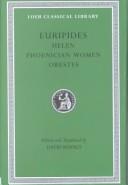
ISBN: 0674996003 9780674996007 Year: 2002 Volume: 5 11 Publisher: Cambridge (Mass.): Harvard university press,
Abstract | Keywords | Export | Availability | Bookmark
 Loading...
Loading...Choose an application
- Reference Manager
- EndNote
- RefWorks (Direct export to RefWorks)
Euripides (c. 485-406 BCE) has been prized in every age for his emotional and intellectual drama. Eighteen of his ninety or so plays survive complete, including Medea, Hippolytus, and Bacchae, one of the great masterpieces of the tragic genre. Fragments of his lost plays also survive.
Helen of Troy (Greek mythology) --- Seven against Thebes (Greek mythology) --- Orestes (Greek mythology) --- Seven against Thebes --- Thebes, Seven against (Greek mythology) --- Mythology, Greek --- Euripides --- Greek drama (Satyr play) --- Greek drama (Tragedy) --- Greek drama --- Mythology, Greek, in literature --- Tragedy --- Greek mythology --- Satyric drama, Greek --- Ėvripid --- Yūrībīdīs --- Euripide --- Euripedes --- Eŭripido --- Eurypides --- Euripidesu --- אוריפידס --- エウリーピデース --- Εὐριπίδης --- Helen, --- Orestes, --- Orest, --- Orestas, --- Oreste, --- Oresti, --- Oresto, --- Oresztész, --- オレステース, --- אורסטס --- 오레스테스, --- اورستس --- Орест, --- Ὀρέστης, --- Elena, --- Helena, --- Helenē, --- Yelena, --- 海伦 , --- ヘレネー, --- הלנה, --- העלענע, --- 헬레네, --- Хелена, --- Єлена, --- Елена , --- هلن, --- هيلين, --- Ἑλένη, --- Drama --- Greek literature --- Dionysia --- Helen of Troy (Greek mythology) - Drama --- Seven against Thebes (Greek mythology) - Drama --- Orestes (Greek mythology) - Drama
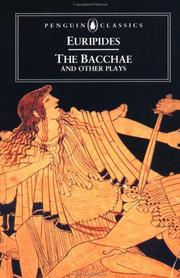
ISBN: 0140440445 9780140440447 Year: 1983 Publisher: Harmondsworth Penguin Books
Abstract | Keywords | Export | Availability | Bookmark
 Loading...
Loading...Choose an application
- Reference Manager
- EndNote
- RefWorks (Direct export to RefWorks)
Classical Greek literature --- Bacchantes --- Euripides --- Pentheus, --- Dionysus --- Ion --- Hecuba, --- Helen, --- Ecuba, --- Hecabe, --- Hécube, --- Hekaba, --- Hekabē, --- Hekabo, --- Hekuba, --- 赫库芭, --- ヘカベー, --- הקובה, --- 헤카베, --- Гекаба, --- Гекуба, --- Хекаба, --- Хекуба, --- هکابه, --- هيكوبا, --- Ἑκάβη, --- Elena, --- Helena, --- Helenē, --- Yelena, --- 海伦 , --- ヘレネー, --- הלנה, --- העלענע, --- 헬레네, --- Хелена, --- Єлена, --- Елена , --- هلن, --- هيلين, --- Ἑλένη, --- Ió --- Iōnas --- Ione --- Jonas --- 伊昂 --- 이온 --- Јон --- Іон --- Йон --- إيون --- Ἴων --- Ἰωνας --- Bacchus --- Bakchos --- Dionís --- Dionisas --- Dioniso --- Dionīss --- Dionisu --- Dioniz --- Dionizi --- Dionizo --- Dionizos --- Dionüszosz --- Dionysos --- Dionýzos --- Diyonizosse --- Διόνυσος --- Дионис --- ديونيسوس --- 디오니소스 --- דיוניסוס --- ディオニューソス --- 狄俄倪索斯 --- Βάκχος --- Діоніс --- Penthée, --- Πενθεύς, --- Τενθεύς, --- Tentheus, --- Ėvripid --- Yūrībīdīs --- Euripide --- Euripedes --- Eŭripido --- Eurypides --- Euripidesu --- אוריפידס --- エウリーピデース --- Εὐριπίδης --- Translations into English.
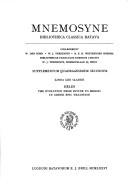
ISBN: 9004047212 9004327517 9789004047211 Year: 1976 Volume: 42 Publisher: Leiden: Brill,
Abstract | Keywords | Export | Availability | Bookmark
 Loading...
Loading...Choose an application
- Reference Manager
- EndNote
- RefWorks (Direct export to RefWorks)
Epic poetry, Greek --- Helen of Troy (Greek mythology) in literature. --- Trojan War --- Women and literature --- Poésie épique grecque --- Hélène (Mythologie grecque) dans la littérature --- Guerre de Troie --- Femmes et littérature --- History and criticism. --- Literature and the war. --- Histoire et critique --- Littérature et guerre --- Helen of Troy (Greek mythology) in literature --- History and criticism --- Literature and the war --- -Helen of Troy (Greek mythology) in literature --- -Women and literature --- -Literature --- Mythology, Greek --- Greek epic poetry --- Epic poetry, Classical --- Greek poetry --- -History and criticism --- Poésie épique grecque --- Hélène (Mythologie grecque) dans la littérature --- Femmes et littérature --- Littérature et guerre --- Epic poetry, Greek. --- Literature. --- Women and literature. --- Literature --- Belles-lettres --- Western literature (Western countries) --- World literature --- Authors --- Authorship --- Helen, --- Elena, --- Helena, --- Helenē, --- Yelena, --- 海伦 , --- ヘレネー, --- הלנה, --- העלענע, --- 헬레네, --- Хелена, --- Єлена, --- Елена , --- هلن, --- هيلين, --- Ἑλένη, --- In literature. --- Trojan War. --- Greece. --- al-Yūnān --- Ancient Greece --- Ellada --- Ellas --- Ellēnikē Dēmokratia --- Elliniki Dimokratia --- Grčija --- Grèce --- Grecia --- Gret͡sii͡ --- Griechenland --- Hellada --- Hellas --- Hellenic Republic --- Hellēnikē Dēmokratia --- Kingdom of Greece --- République hellénique --- Royaume de Grèce --- Vasileion tēs Hellados --- Xila --- Yaṿan --- Yūnān --- Philology --- Epic poetry, Greek - History and criticism --- Trojan War - Literature and the war --- Women and literature - Greece
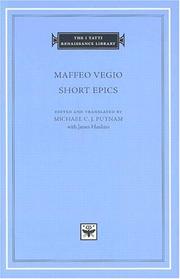
ISBN: 9780691125374 0691125376 9780674014831 9786612129698 1282129694 1400827426 0674014839 9781400827428 9780691125376 Year: 2006 Volume: 15 Publisher: Princeton: Princeton university press,
Abstract | Keywords | Export | Availability | Bookmark
 Loading...
Loading...Choose an application
- Reference Manager
- EndNote
- RefWorks (Direct export to RefWorks)
"The lives of Catullus and Horace overlap by a dozen years in the first century BC. Yet, though they are the undisputed masters of the lyric voice in Roman poetry, Horace directly mentions his great predecessor, Catullus, only once, and this reference has often been taken as mocking. In fact, Horace's allusion, far from disparaging Catullus, pays him a discreet compliment by suggesting the challenge that his accomplishment presented to his successors, including Horace himself. In Poetic Interplay, the first book-length study of Catullus's influence on Horace, Michael Putnam shows that the earlier poet was probably the single most important source of inspiration for Horace's Odes, the later author's magnum opus. Except in some half-dozen poems, Catullus is not, technically, writing lyric because his favored meters do not fall into that category. Nonetheless, however disparate their preferred genres and their stylistic usage, Horace found in the poetry of Catullus, whatever its mode of presentation, a constant stimulus for his imagination. And, despite the differences between the two poets, Putnam's close readings reveal that many of Horace's poems echo Catullus verbally, thematically, or both. By illustrating how Horace often found his own voice even as he acknowledged Catullus's genius, Putnam guides us to a deeper appreciation of the earlier poet as well"--Provided by publisher.
Helen of Troy (Greek mythology) in literature. --- Influence (Literary, artistic, etc.). --- Odes, Latin --- Hélène (Mythologie grecque) dans la littérature --- Influence littéraire, artistique, etc. --- Odes latines --- History and criticism. --- Histoire et critique --- Horace --- Catullus, Gaius Valerius --- Virgil --- Knowledge --- Literature. --- Influence. --- In literature. --- Rome --- Rome dans la littérature --- Helen of Troy (Greek mythology) in literature --- Influence (Literary, artistic, etc.) --- Odes --- History and criticism --- Literature --- Influence --- In literature --- Hélène (Mythologie grecque) dans la littérature --- Influence littéraire, artistique, etc. --- Rome dans la littérature --- Artistic impact --- Artistic influence --- Impact (Literary, artistic, etc.) --- Literary impact --- Literary influence --- Literary tradition --- Tradition (Literature) --- Vergil --- Virgile --- Virgilio Máron, Publio --- Virgilius Maro, Publius --- Vergili Maronis, Publius --- Catul --- Catull --- Catulle --- Catulli, C. Valerii --- Catullo, Gaio Valerio --- Catullus, C. Valerius --- Catullus, Gaius Valerius, --- Catullus, Gajus Valerius --- Catulo --- Katull, Gaǐ Valeriǐ --- Katullus, Kaius Valerius --- Valerio Cátulo, Cayo --- Катулл --- Orazio --- Horacij Flakk, Kvint --- Epic poetry, Latin (Medieval and modern) --- Astyanax (Legendary character) --- Jason (Greek mythology) --- Poésie épique latine médiévale et moderne --- Astyanax (Personnage légendaire) --- Enée (Personnage légendaire) --- Jason (Mythologie grecque) --- Vegio, Maffeo, --- Anthony, --- Poésie épique latine médiévale et moderne --- Astyanax (Personnage légendaire) --- Enée (Personnage légendaire) --- Lyric poetry --- Poetry --- Art --- Influence (Psychology) --- Intermediality --- Intertextuality --- Originality in literature --- Helen, --- Elena, --- Helena, --- Helenē, --- Yelena, --- 海伦 , --- ヘレネー, --- הלנה, --- העלענע, --- 헬레네, --- Хелена, --- Єлена, --- Елена , --- هلن, --- هيلين, --- Ἑλένη, --- Aeneas (Legendary character) --- Latin epic poetry, Medieval and modern --- Latin poetry, Medieval and modern --- Scamandrius (Legendary character) --- Legends --- Veggius, Mapheus, --- Vegius, Mapheus, --- Anbā Anṭūnīyūs, --- Anthony the Abbot, --- Antoine, --- Antoniĭ Velikiĭ, --- Antonio, --- Antonius, --- Antonius Magnus, --- Antony, --- Qiddīs Anṭūnīyūs, --- قديس مصر أنطونيوس --- Horatius Flaccus, Quintus --- Vergilius Maro, Publius --- in literature. --- Horatius Flaccus, Q. --- Translations into English. --- Poetry. --- Traductions anglaises --- Poésie --- Virgilius Maro, Publius, --- Virgilio Marone, P., --- Vergilīĭ, --- Virgile, --- Vergílio, --- Wergiliusz, --- Vergilīĭ Maron, P. --- Vergilīĭ Maron, Publīĭ, --- Verhiliĭ Maron, P., --- Vergil, --- Virgilio, --- Virgilīĭ, --- Virgilius Maro, P., --- Virgil Maro, P., --- ווירגיל, --- וירגיליוס, --- ורגיליוס, --- מרו, פובליוס ורגיליוס, --- فرجيل, --- Pseudo-Virgil, --- Pseudo Virgilio, --- Virgilio Marón, Publio, --- Bhārjila, --- Vergilius Maro, P. --- Vergilius --- Virgilio Marone, P. --- Vergilīĭ --- Vergílio --- Wergiliusz --- Vergilīĭ Maron, Publīĭ --- Verhiliĭ Maron, P. --- Virgilio --- Virgilius Maro, P. --- Virgil Maro, P. --- Pseudo-Virgil --- Pseudo Virgilio --- Virgilio Marón, Publio --- Bhārjila --- Catullus, Caius Valerius --- Aeneas --- Jason --- Helen --- Anton, --- Gorat︠s︡īĭ --- Gorat︠s︡iĭ Flakk, Kvint --- Horacij --- Horacio, --- Horacio Flaco, Q. --- Horacjusz --- Horacjusz Flakkus, Kwintus --- Horacy --- Horaṭiyos --- Horaṭiyus --- Horats --- Horaz --- Khorat︠s︡iĭ --- Khorat︠s︡iĭ Flak, Kvint --- Orazio Flacco, Quinto --- הוראציוס --- הורטיוס --- Odes - History and criticism --- Horace - Knowledge - Literature --- Catullus, Gaius Valerius - Influence --- Virgil - In literature --- Rome - In literature --- Marone, Publio Virgilio --- Vegio, Maffeo
| Listing 1 - 9 of 9 |
Sort by
|

 Search
Search Feedback
Feedback About UniCat
About UniCat  Help
Help News
News